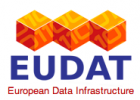You are here
EUDAT - Towards a Collaborative Data Infrastructure

Europe’s science and research communities from a wide range of scientific fields are faced with increasingly large amounts of valuable data that stem from new sources such as powerful new sensors and scientific instruments used in analyses, experiments and observations as well as growing volumes of data from simulations and from the digitization of library resources. In order to make the most of the new opportunities emerging from this “explosion” of data, the EUDAT consortium intends to build a sustainable pan-European infrastructure for scientific data. EUDAT is a European initiative that will deliver a Collaborative Data Infrastructure (CDI) with the capacity and capability for meeting future researchers’ needs in a sustainable way. Its design will reflect a comprehensive picture of the data service requirements of the research communities in Europe and beyond. This will become increasingly important over the next decade as we face the challenges of massive expansion in the volume of data being generated and preserved (the so called ‘data tsunami’) and in the complexity of that data and the systems required to provide access to it.
The main goals pursued by the consortium in the 3 years of activity are to
- Help fulfill the vision of a European Data e-infrastructure by providing a sustainable platform of technologies, tools and services driven by userneeds;
- Engage users including individual researchers, universities, research labs, libraries, etc;
- Produce the common low-level services required to provide the level of interoperation and trust of data necessary to support widespread access, long-term preservation for use and re-use;
- Ensure that the data infrastructure is sufficiently robust to keep pace with the expected acceleration of the scale and complexity of scientific data.
The EUDAT partnership includes key representatives from research communities in linguistics (CLARIN), earth sciences (EPOS), climate sciences (ENES), environmental sciences (LIFEWATCH), and biological and medical sciences (VPH). Other communities have accepted to join EUDAT as associated members, representing altogether 15 specific research disciplines across all major fields of science. EUDAT does also target disciplines and communities beyond this initial set of communities.
CINECA is the fourth partner, among 25, in terms of planned effort and it is involved in the main technical work packages. In particular it leads the activities related to technology appraisal and service provisioning. CINECA, with the INGV, represents the EPOS (European Plate Observing System) community.
For info please contact: info-hpc@cineca.it
EUDAT: http://www.eudat.eu/
EPOS: http://www.epos-eu.org/
